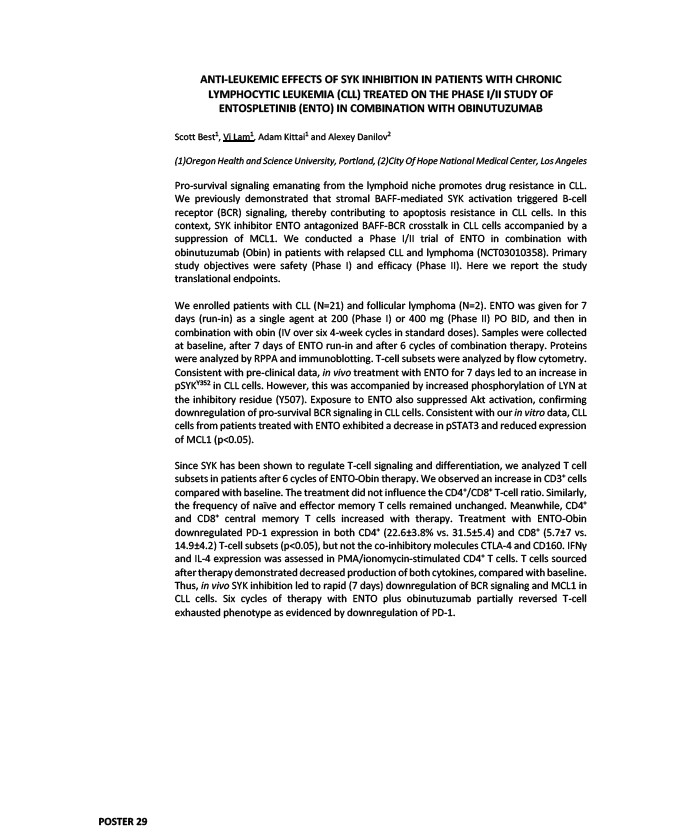
ANTI-LEUKEMIC EFFECTS OF SYK INHIBITION IN PATIENTS WITH CHRONIC
LYMPHOCYTIC LEUKEMIA (CLL) TREATED ON THE PHASE I/II STUDY OF
ENTOSPLETINIB (ENTO) IN COMBINATION WITH OBINUTUZUMAB
Scott Best1, Vi Lam1, Adam Kittai1 and Alexey Danilov2
(1)Oregon Health and Science University, Portland, (2)City Of Hope National Medical Center, Los Angeles
Pro-survival signaling emanating from the lymphoid niche promotes drug resistance in CLL.
We previously demonstrated that stromal BAFF-mediated SYK activation triggered B-cell
receptor (BCR) signaling, thereby contributing to apoptosis resistance in CLL cells. In this
context, SYK inhibitor ENTO antagonized BAFF-BCR crosstalk in CLL cells accompanied by a
suppression of MCL1. We conducted a Phase I/II trial of ENTO in combination with
obinutuzumab (Obin) in patients with relapsed CLL and lymphoma (NCT03010358). Primary
study objectives were safety (Phase I) and efficacy (Phase II). Here we report the study
translational endpoints.
We enrolled patients with CLL (N=21) and follicular lymphoma (N=2). ENTO was given for 7
days (run-in) as a single agent at 200 (Phase I) or 400 mg (Phase II) PO BID, and then in
combination with obin (IV over six 4-week cycles in standard doses). Samples were collected
at baseline, after 7 days of ENTO run-in and after 6 cycles of combination therapy. Proteins
were analyzed by RPPA and immunoblotting. T-cell subsets were analyzed by flow cytometry.
Consistent with pre-clinical data, in vivo treatment with ENTO for 7 days led to an increase in
pSYKY352 in CLL cells. However, this was accompanied by increased phosphorylation of LYN at
the inhibitory residue (Y507). Exposure to ENTO also suppressed Akt activation, confirming
downregulation of pro-survival BCR signaling in CLL cells. Consistent with our in vitro data, CLL
cells from patients treated with ENTO exhibited a decrease in pSTAT3 and reduced expression
of MCL1 (p<0.05).
Since SYK has been shown to regulate T-cell signaling and differentiation, we analyzed T cell
subsets in patients after 6 cycles of ENTO-Obin therapy. We observed an increase in CD3+ cells
compared with baseline. The treatment did not influence the CD4+/CD8+ T-cell ratio. Similarly,
the frequency of naïve and effector memory T cells remained unchanged. Meanwhile, CD4+
and CD8+ central memory T cells increased with therapy. Treatment with ENTO-Obin
downregulated PD-1 expression in both CD4+ (22.6±3.8% vs. 31.5±5.4) and CD8+ (5.7±7 vs.
14.9±4.2) T-cell subsets (p<0.05), but not the co-inhibitory molecules CTLA-4 and CD160. IFNγ
and IL-4 expression was assessed in PMA/ionomycin-stimulated CD4+ T cells. T cells sourced
after therapy demonstrated decreased production of both cytokines, compared with baseline.
Thus, in vivo SYK inhibition led to rapid (7 days) downregulation of BCR signaling and MCL1 in
CLL cells. Six cycles of therapy with ENTO plus obinutuzumab partially reversed T-cell
exhausted phenotype as evidenced by downregulation of PD-1.
POSTER 29